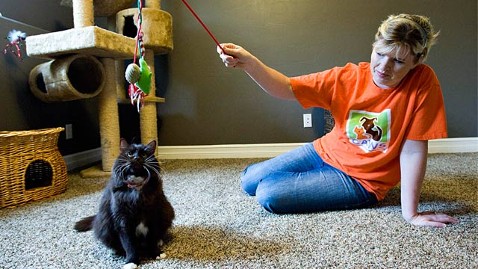Cat Survives 2 Rounds in Gas Chamber, but Can't Change City Policy

The Salt Lake Tribune/Djamila Grossman/AP Photo
A stray cat in Utah's will to survive was enough to let it live out the rest of its nine lives with an adopted family, but not enough to change the animal euthanasia policy in the town where it lives.
Officials at the West Valley City Animal Shelter in Utah tried to euthanize the cat, named Andrea, in a gas chamber in October after 30 days passed without her adoption from the shelter.
She survived that attempt, so shelter officials tried again. This time, Andrea appeared dead, so officials followed shelter policy by placing her body in a plastic bag inside a 40 degree cooler.
When a shelter employee later opened the cooler, there was Andrea, meowing. At that point, shelter officials decided the black kitty deserved a third chance at life.
"Shelter tech who discovered the animal decided after the second attempt that the animal had been put through enough and wanted to attempt an another adoption try again," West Valley City manager Wayne Pyle told ABCNews.com.
This time, thanks to the media attention heralding her survival story, Andrea found a home with a local family.
Her story also rallied animal advocates, led by the Community Animal Welfare Society, which took in Andrea until she found a home, to argue against the use of the gas chamber to put stray animals to death.
The shelter currently conducts 49 percent of euthanasia cases via injection, and 51 percent using carbon monoxide.
A group of nearly a half dozen advocates spoke at a West Valley City Council meeting Tuesday evening to ask that city officials eliminate the carbon monoxide chamber that was used on Andrea, and instead rely only on shots to euthanize animals, arguing the shots are more humane.
City council members, however, were not swayed. Pyle said the city did not plan to make any changes to the current policy and method of euthanizing cats if they are not adopted within 30 days.
"This issue has been examined closely multiple times since the shelter's construction," Pyle said. "We're comfortable that the policy in place is a good one."
The shelter, meanwhile, is investigating why the gassings failed.